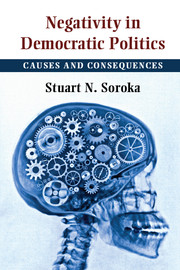Book contents
Preface
Published online by Cambridge University Press: 05 June 2014
Summary
One mouse dropping ruins the whole pot of rice porridge.
– Chinese proverbModern politics is overwhelmingly negative in tone. Everyday political reporting focuses on conflicts in the legislature, on major policy issues that have thus far been ignored, on political problems at home and abroad. It is accepted wisdom that following a brief post-election “honeymoon,” governing parties and candidates tend to suffer a gradual decline in approval. (It is apparently nearly impossible to both govern and maintain support for governing.) Campaigns are regularly strewn with attack ads, and even when they are not, journalists debate whether or when the campaign will “go negative.”
Why is modern politics so negative? And what are the consequences of that negativity? These are the two questions driving the work in this book. The answers have at their root theories drawn from disparate fields in the social and physical sciences – theories that try to describe and explain the negativity biases that seem to be so prevalent in social, economic, and political interactions. But the application of these theories is, in this case, entirely focused on politics.
- Type
- Chapter
- Information
- Negativity in Democratic PoliticsCauses and Consequences, pp. xiii - xviiiPublisher: Cambridge University PressPrint publication year: 2014

